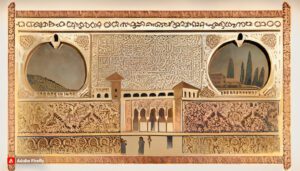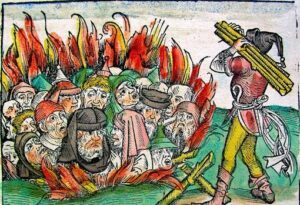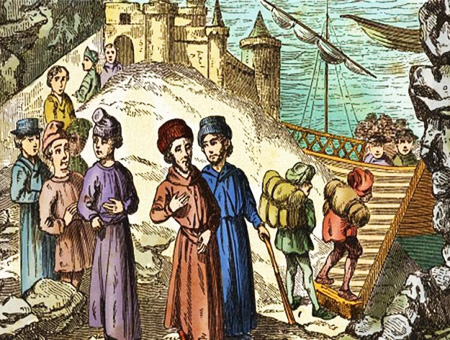The Alhambra Decree of 1492 was a pivotal moment in the history of the Jewish people, and in the history of Spain. This decree, issued by the Catholic monarchs of Spain, Isabella and Ferdinand, ordered the expulsion of all Jews from the country. It marked the end of a long period of coexistence between Jews and Christians in Spain, and had far-reaching consequences that reverberated across the Mediterranean and beyond. One of the most significant outcomes of the decree was the migration of Jewish writers and intellectuals to the Arab world, where they made significant contributions to Arabic literature and culture.

The Jews had a long and complex history in Spain, dating back to the Roman Empire. After the Visigothic conquest of Spain in the 5th century, Jews were granted protection and were able to practice their religion freely. Under Islamic rule, which began in the 8th century, Jews flourished in Spain, particularly in the southern region of Andalusia. The Islamic rulers of Spain, known as the Moors, allowed Jews to hold important positions in government and commerce, and encouraged intellectual exchange between Jews, Muslims, and Christians. This period of coexistence and cultural exchange, known as the Convivencia, is often seen as a golden age of Spanish history.
The situation for Jews in Spain began to change in the late 14th century, with the rise of anti-Semitic sentiment among the Christian population. This was fueled in part by the Black Death, which devastated Europe in the mid-14th century and was blamed on the Jews. Anti-Semitic riots and attacks became increasingly common, and Jews were gradually stripped of their rights and freedoms. In 1391, a series of anti-Semitic riots swept across Spain, leading to the forced conversion of many Jews to Christianity. These converts, known as conversos or New Christians, were often persecuted and discriminated against by both Christians and Jews.
The situation for Jews in Spain worsened in the late 15th century, with the consolidation of power by Isabella and Ferdinand. The Catholic monarchs were determined to establish a unified Christian state in Spain and saw the Jews as a threat to their plans. In 1478, they established the Spanish Inquisition, which was charged with rooting out heresy and non-Christian beliefs. The Inquisition targeted not only Jews but also conversos and Muslims, and was responsible for the torture and execution of thousands of people.
In 1492, Isabella and Ferdinand issued the Alhambra Decree, which ordered the expulsion of all Jews from Spain. The decree gave Jews four months to leave the country, and threatened severe punishment for those who refused. The decree also confiscated the property and possessions of the Jews, leaving them with little choice but to flee. It is estimated that around 200,000 Jews were expelled from Spain as a result of the decree, and many more were forced to convert to Christianity.


The impact of the Alhambra Decree was far-reaching, both for the Jews who were expelled and for the countries that received them. Many Jews fled to Portugal, where they were allowed to stay for a time before being expelled again in 1497. Others traveled to North Africa, Italy, and the Ottoman Empire. One of the most significant destinations for Jewish refugees was the Arab world, particularly the Ottoman Empire and the cities of Cairo and Istanbul.
The migration of Jewish writers and intellectuals to the Arab world had a profound impact on Arabic literature and culture. These Jewish exiles brought with them a wealth of knowledge and expertise, particularly in the fields of science, philosophy, and literature. They also brought with them a deep knowledge of Hebrew and Jewish culture, which they were able to share with their new hosts. Many of these exiles quickly became influential members of Arab society, and made significant contributions to Arabic literature.
One of the most famous Jewish exiles in the Arab world was Moses Maimonides, a physician, philosopher, and Jewish scholar who lived in Spain in the 12th century. After the Alhambra Decree, many Jews in Spain looked to Maimonides as a source of inspiration and guidance. Maimonides eventually settled in Egypt, where he served as a physician to the Muslim ruler Saladin and wrote some of his most influential works, including the Guide for the Perplexed and the Mishneh Torah. His works were widely read and studied by both Jews and Muslims, and had a profound impact on medieval Arabic literature.
Other Jewish exiles in the Arab world made significant contributions to Arabic literature in their own right. The poet Samuel ibn Naghrillah, for example, was a prominent figure in the Jewish community of Cordoba before he was forced to flee to Granada and then to Egypt. In Egypt, he became a patron of Arabic poetry and was known for his lavish gifts to poets and scholars. His own poetry, which was written in Arabic, is considered some of the finest poetry of the medieval period.
Another significant Jewish exile in the Arab world was Judah Halevi, a poet and philosopher who lived in Spain in the 12th century. Halevi wrote extensively in Hebrew, but also wrote in Arabic and was known for his ability to blend Jewish and Islamic traditions in his writing. After the Alhambra Decree, many Jews in Spain looked to Halevi as a symbol of resistance and perseverance. His works, which included poems, essays, and treatises on Jewish theology, had a significant impact on both Jewish and Arabic literature.
The migration of Jewish writers and intellectuals to the Arab world also had a significant impact on the development of Arabic literature. These Jewish exiles brought with them a deep knowledge of Hebrew and Jewish culture, which they were able to share with their new hosts. They also brought with them new literary styles and techniques, which helped to expand the boundaries of Arabic literature.
One example of this influence can be seen in the work of the poet Solomon ibn Gabirol, who lived in Spain in the 11th century. Ibn Gabirol was deeply influenced by Jewish mysticism and philosophy, but he also drew on Arabic literary traditions in his writing. His poetry, which was written in both Hebrew and Arabic, was known for its complex imagery and sophisticated use of language. Ibn Gabirol’s work had a significant influence on Arabic poetry and helped to shape the development of the muwashshah, a form of Arabic poetry that was heavily influenced by Hebrew and Jewish traditions.
Another example of the influence of Jewish writers on Arabic literature can be seen in the work of the poet Ibn Zaydun, who lived in the 11th century. Ibn Zaydun was a member of the Andalusian court of King Al-Mu’tamid, and was known for his passionate love poetry. His work was deeply influenced by the Hebrew love poetry of his Jewish contemporaries, particularly Solomon ibn Gabirol. Ibn Zaydun’s poetry helped to establish the genre of Arabic love poetry, which would become one of the most important genres of medieval Arabic literature.
In addition to their contributions to Arabic literature, Jewish writers and intellectuals in the Arab world played an important role in shaping the intellectual and cultural life of their new communities. They served as translators, interpreters, and cultural intermediaries between Jewish and Arab cultures, helping to promote mutual understanding and cooperation. They also played a key role in preserving and transmitting the legacy of Jewish culture and learning, which had been largely destroyed in Spain.
Overall, the Alhambra Decree of 1492 and the subsequent migration of Jewish writers and intellectuals to the Arab world had a profound impact on both Jewish and Arabic literature. It led to a cross-pollination of literary and cultural traditions, which helped to expand the boundaries of both Jewish and Arabic literary expression. It also helped to foster greater mutual understanding and cooperation between Jewish and Arab cultures, which remains an important legacy today.
Despite the challenges and hardships that the Jewish exiles faced in their new homes, they were able to make significant contributions to the cultural and intellectual life of the Arab world. Their legacy continues to be celebrated and studied by scholars and readers around the world. The story of the Alhambra Decree and the subsequent migration of Jewish writers and intellectuals to the Arab world serves as a reminder of the importance of cultural exchange and the power of literature to bridge divides and bring people together.






